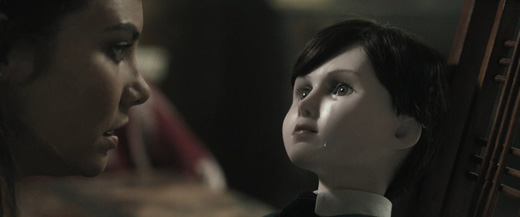Movie Review: The Boy
By Ben Gruchow
January 28, 2016
BoxOfficeProphets.com

It is, however, a modestly absorbing mystery for most of its duration, with a final-act revelation that provides a nice jolt while just hanging together on a logistical basis. Those traits alone are some kind of minor miracle, one which I attribute to director William Brent Bell not directing his own screenplay for once. Bell's two previous major outings - 2006's Stay Alive and 2012's notorious The Devil Inside - were not just below-average in quality; Inside got a rare F Cinemascore, while Stay Alive resided at a certain sub-basement of trashy idiocy that was almost surreal. Here, Bell directs a screenplay by newcomer Stacey Menear; the result is a B-movie plot and characters that at least cohere together on the same wavelength.
The stunning simplicity of the story doesn't hurt. The cast numbers a grand total of 10 here, and only a couple of those are onscreen for more than a minute or so. Most of the movie, in fact, is a one-woman show, with Lauren Cohan holding the bulk of the story on her shoulders as nanny Greta Evans. We meet her as she is arriving at the English-countryside home of Mr. and Mrs. Heelshire; she's there as a nanny for their son Brahms. What she finds out - and what we already know if we've seen the trailers - is that Brahms is actually a life-sized porcelain doll, cared for and doted on by the Heelshires as if he were flesh and blood. His parents are taking a holiday, leaving Greta to care for Brahms and the house, and Mrs. Heelshire leaves her with a list of duties - play loud music at all times, always kiss Brahms good-night, and the only visitor allowed is Malcolm the grocery-delivery man (Rupert Evans) - that indicate either a delusional parent or a sentient doll.
The Heelshires exit pretty early on; absent the occasional visit from Malcolm, we're mostly watching Greta watch porcelain while atmosphere happens, and it's not long before strange things start to happen (up to and including Brahms being able to move himself). That this is as involving as it is largely ends up being because of low-key performances by Cohan and Evans, paired with impressive composition and depth to the framing of the house they're in. The hook that we're given regarding Brahms - that he was once a real boy who died tragically in a house fire, with the doll appearing mysteriously a short time after - relies pretty well on our own knowledge of genre tropes, with the uttered descriptor “He was an odd boy” getting us more than halfway on the path to understanding the overall shape of the movie.
There must have been great temptation to ham it up with such a B-movie premise - and really, I wouldn't have minded a bit if that's what had happened - but Greta and Malcolm register instead as quietly disturbed and, in several cases, almost resigned to their fate. This doesn't produce something that's especially good, but it gives the movie a little bit of dignity and poise that matters when it comes to selling the audience on something beyond camp. There is a moment about halfway through where Greta finally realizes that Brahms really is more than he seems to be - the moment involves a sandwich on a tray - and the actress runs a surprisingly subtle gamut of believable emotion. It's brief, and it's not pathos, but it's a clear effort to communicate a character's essence rather than just the lines written for it. I appreciate moments like that.
These moments ultimately end up being pretty few and far between, and the biggest thing The Boy has going for it after the initial bridge between non-belief and belief is the final-act twist. I must give credit to Bell and Menear, even if it's only in an academic sense; I didn't necessarily see the events of the climax coming, and the moment of the actual reveal is nicely staged. Bell and Pearl light and block that moment, involving a broken mirror, to suggest a weird confusion of scale and space that's not particularly common in an age of meticulously arranged and presented cinematic moments.
The sequence following this gives us enough time to acknowledge that the supernatural events in the movie before it bear the weight of the revelation. The crucial development that instigates the final act of the movie involves a broken Brahms doll, and I was frankly expecting the movie to go bigger at that point; I'm glad that the movie subverted those expectations to the degree that it did.
The Boy is ultimately still a throwaway piece of junk food, and it'll be consigned to faintly-remembered cinematic history sooner rather than later. I can't really recommend the movie for anyone but the most undemanding fans of PG-13 horror - but I'll tell you this: far more than producing one of the year's worst films right off the bat, Bell has done too much right for the movie to be panned. By the end credits, we get the feeling that the story was given some measure of consideration before it was written, and Menear didn't bite off more than she could chew substantially.
I've barely touched upon the look of the thing, which is its best asset by a mile; although it's never actually frightening, Pearl employs such judicious use of shadows and contrast and depth of field that the movie is nearly always pleasurable to look at. If what transpired inside of those visuals were half as deep and evocative, we'd really have something here.